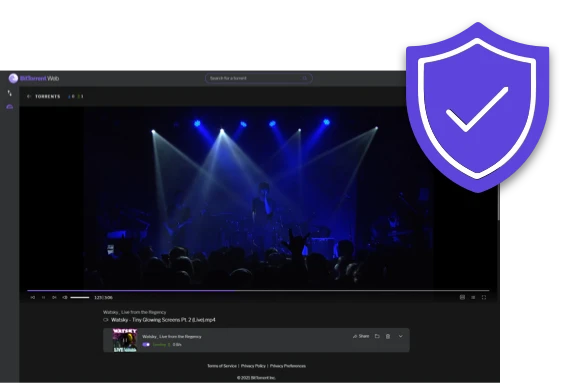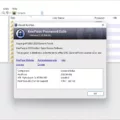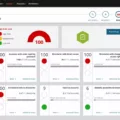Are you a fan of torrenting? If so, you’ve probably asked yourself, “Is BitTorrent safe?” It’s a reasonable question to ask, given the prevalence of cyber threats and privacy issues that can arise from downloading content online.
First and foremost, it should be noted that BitTorrent is a legitimate file transfer protocol for sharing files online. It is commonly used to share large files such as movies and TV shows quickly and efficiently. In itself, it is not an illegal activity. That said, using BitTorrent to download copyrighted material without the copyright owner’s permission is illegal.
So while using BitTorrent is legal in most cases, it is important to understand the potential safety concerns associated with torrenting. The main risks are malware, spyware, viruses, and hackers taking advantage of your personal information.
To reduce these risks, it is essential to use a reliable antivirus program on your computer or device before downloading any files via BitTorrent. Additionally, you should also make sure that you are using a secure connection when torrenting as this will help protect your data from third-party snoopers. Moreover, if you want maximum protection for your online activities when downloading torrents then you should consider investing in a Virtual Private Network (VPN). A VPN will mask your IP address and encrypt all your traffic – making it virtually impossible for anyone to snoop on what you’re doing online.
Furthermore, there are certain precautions you can take when choosing which files to download via BitTorrent: avoid clicking on suspicious links or ads; steer clear of malicious sites; only download content from well-known websites; double-check the file size before downloading; read through any comments left by other users; and use caution when downloading executables (.exe) files as they may contain malicious code.
if you take the proper measures – such as using an antivirus program or VPN – then BitTorrent can be relatively safe for downloading digital content online. However, if you do not use adequate security measures then there may be many potential dangers associated with torrenting that could harm your computer or device – or potentially even put your personal information at risk of being stolen by hackers or other unwelcome third parties.

The Safety of Downloading from BitTorrent
Yes, downloading from BitTorrent can be safe, as long as you take the proper precautions. Before downloading any file from the internet, it is important to make sure that it is coming from a legitimate source and that it does not contain any malicious software. Additionally, if you are downloading copyrighted material without the permission of the copyright holder, then it is not legal and could lead to legal action. To make sure your downloads are safe, use reputable torrent sites such as The Pirate Bay or RARBG to search for files and download them using a secure connection. It is also important to have an up-to-date antivirus program installed on your device since this will help detect and remove any malicious software before it can do harm. Finally, always read reviews of any file before you download it so you can make sure that it is legitimate and safe to use.
Can I Be Hacked Through BitTorrent?
Yes, it is possible to get hacked through BitTorrent. If you are not careful when downloading torrents, you could be exposing yourself to malicious software, hackers, or other unwelcome third parties. To protect yourself, it is important to only download torrents from trusted sources and to use a secure VPN connection when downloading. Additionally, make sure your anti-virus and anti-malware software is up-to-date and that you have a firewall enabled on your device. Taking these steps will help protect your data and privacy while using BitTorrent.
Comparing the Safety of BitTorrent and uTorrent
BitTorrent is generally considered to be the more secure option when compared to uTorrent. This is because BitTorrent offers a Pro+VPN plan that comes with Cyber Ghost, which provides an extra layer of security while downloading files. Cyber Ghost hides your IP address from potential snoopers, encrypts data, and blocks malware and ads. Additionally, BitTorrent also includes a built-in firewall for added security. uTorrent is also secure in its own right; however, it does not provide the same level of protection as BitTorrent’s Pro+VPN plan.
Can Downloading Files Through BitTorrent Put Your Computer At Risk of Viruses?
No, BitTorrent itself cannot give you viruses. It is a platform that facilitates peer-to-peer file sharing. The files shared through BitTorrent could potentially contain viruses, so it is important to take caution when downloading files from unknown sources. As with any file-sharing service, it is recommended that you use up-to-date antivirus software and be vigilant when downloading files from the internet.
What Is The Safest BitTorrent Option?
The safest BitTorrent client is undoubtedly qBittorrent. It is open-source software that is completely free to use and comes with no adware or malware. It offers a simple user interface, but also has a wealth of advanced features and settings for users to customize their experience. Its encryption technology ensures your connection is safe and secure while downloading, making it one of the safest BitTorrent clients available. Furthermore, it is regularly updated with the latest security fixes which make sure it can protect you from any potential threats. All in all, qBittorrent is an excellent choice for anyone looking for a secure, reliable, and safe BitTorrent experience.
The Dangers of Torrenting
Torrenting can be a convenient way to quickly download large amounts of data, but it comes with a number of risks.
Firstly, downloading copyrighted material is illegal and carries the possibility of hefty fines or even jail time. Even if you only download legal files, you may inadvertently download malicious software disguised as a legitimate file – this could potentially infect your computer and compromise your personal data. Additionally, some torrents may be maliciously “seeded” with hidden spyware or adware that can track your online activities in order to target you with ads or scam attempts.
Another risk posed by torrenting is that your Internet Service Provider (ISP) might throttle or even terminate your service if they detect excessive peer-to-peer activity on your connection. Furthermore, the lack of anonymity associated with torrenting means that anyone who downloads a file can be identified by their IP address, making it easier for copyright trolls to target alleged infringers with lawsuits.
Finally, depending on where you are located geographically, torrenting may simply not be legal. In some countries, there are strict laws against peer-to-peer file sharing and accessing certain websites, so it’s important to check the local laws before attempting to access any content via torrents.
In conclusion, while torrenting offers fast and easy access to large pieces of data, it’s important to consider the risks before using this method for downloading content. Make sure to always use caution when downloading anything from the internet – including torrents – and make sure to stay up-to-date on any relevant laws in your area.
Conclusion
In conclusion, BitTorrent is a legitimate file transfer protocol and can be used safely if the proper security measures are taken. While torrenting is legal as long as the content can be downloaded or uploaded legally, it does come with risks, such as malware, spyware, and viruses. To ensure your safe use of BitTorrent, it is highly recommended that you take advantage of a Pro+VPN plan that comes with Cyber Ghost or another secure VPN service. Doing so will help protect your personal information and make sure your downloading activities remain secure.












